It’s the time of year for saving money!
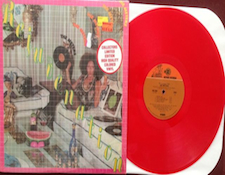
If you’ve been reading my columns, you have heard me going on
about the great pressings that the folks at Rhino have been overseeing for a
variety of labels that — in all likelihood — they own as part of the Warner
Brothers empire.
They have been doing a really nice job and I say that not only
because I have a friend who works there (full disclosure) but because I
genuinely like what they’ve been doing for the most part from the perspective
of a life-long record collector (I bought my first single at five years old).
Someone somewhere in that company is a genuine collector and music fan and it
comes through in the fine details.
Take a recent batch of albums I picked up by The Meters. These
are seminal albums of vintage funk soul out of New Orleans featuring future
members of The Neville Brothers and produced by the great Allan Toussaint. In
the pre-Internet days of record collecting, I frequently wanted to check out
these records on vinyl, but — frankly — you rarely saw these albums in the
used shops as they’d been out of print for ages. When I have seen them, they
were often priced just out of my range.
Some of these original pressings still pull in upwards of $50 to $100
each in perfect condition. Given these were party records of the finest order,
the odds of finding a mint condition original at a reasonable price is pretty
slim.
So getting a quality reissue for under $15 is a very appealing
prospect.
What makes a good reissue in my book?
A well centered pressing on thick, quiet vinyl free of bubbles,
pops, nicks, ticks and warps
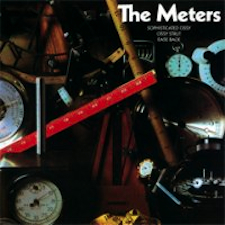
A good sounding source tape — the record should have a good
dynamic range, warm mids and low lows plus crisp highs. Too much hiss may
indicate a slave copy (or copy of a copy) was used; too little high end may
mean sloppy noise reduction was employed somewhere along the food chain,
resulting in a release that is murky sounding
High quality, original, period accurate album and label art –
both the printing quality and thickness of the carboard use are crucial.
Back to The Meters, on my way home from Southern California, I
stopped in Salzer’s Records in Ventura and found a trio of Meters reissues on
colored vinyl selling for less than $10 each, so I could’t resist buying them
— I had recently purchased the 1st and 3rd Meters albums on 180-gram vinyl
(for $13 each) up in San Francisco, so I thougth this would be a good time to
compare and contrast.
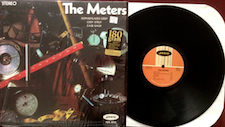
I must say that the 180-gram pressings are really sweet, with
thick dark, dead quiet vinyl, lovely original labels and high quality cover
art. The recordings within sound fantastic! The pleasant surprise is that the
colored vinyl pressings sound full and rich as well, and those are probably
more standard weight 140 gram pressings. They are still plenty sturdy, but
noticeably a little thinner. Only one of these has a warp in it and I suspect
it was due to improper storage or overly hot shrink wrap — for the $10 I paid
for it, I can live with the warp until I find a better copy (at least its not
off center!)
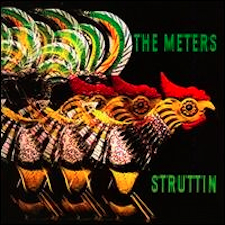
They all sound really fine! Tracks like “Ride Your
Pony” on Struttin’ have that killer hot/oversaturated analog tape-recorded
drum sound driving a relentless groove that makes you want to get up and dance.
Rejuvination (from 1974) is home of the classic tune “Hey Pocky
A-Way” which became a staple of The Grateful Dead’s live sets in the 80s
and 90s. Cabbage Alley (from 1972) may well be my favorite with the killer
opening tune “You’ve Got to Change (You’ve Got To Reform)” and a
stunning cover of Neil Young’s “Birds” from After the Goldrush.
However, they look really cool on the turntable: Rejuvination
on yellow vinyl, Cabbage Alley on green (both on early 70s two tone Reprise
record labels) and the earlier albums, The Meters and Struttin’ on different
incarnations of the once-indie label imprint Josie Records.
Yes, they look cool.
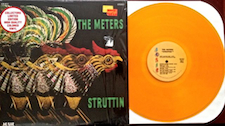
Yeah, I know some of you audiophiles don’t care about that sort
of thing but that is the difference between us fans who want the full monty in
terms of the original album experience. The good thing is all of these albums
are available on 180-gram black vinyl too so seek those out if that is what you
prefer.
Something for everyone — what a concept.
Thanks Mr. Rhino record collector angel person whoever you are
making these reissues happen!
Mark Smotroff is a freelance writer and avid music collector
who has worked for many years in marketing communications for the consumer
electronics, pro audio and video games industries, serving clients including
DTS, Sega, Sony, Sharp, AT&T and many others. Mark has written for EQ
Magazine, Mix Magazine, Goldmine/DISCoveries Magazine, Sound+Vision Magazine
and HomeTechTell.com. He is also a musician
/ composer who’s songs have been used in TV shows such as Smallville and Men In
Trees as well as films and documentaries. Mark is currently rolling out a new
musical he’s written. www.smotroff.com





